Lebanon
Since 2008, DCAF has collaborated with various Lebanese institutions to advance security sector reforms. The Lebanon office works alongside security institutions, judiciary, parliament, independent bodies, civil society, media, and academia to promote good governance including transparency, human rights, rule of law and inclusiveness.
DCAF’s priorities include strengthening oversight, torture prevention, legal reforms, mediation, enhancing civil-military cooperation, gender-sensitive security, and driving security sector change management.
Current projects include:
• Supporting the LAF in Strengthening Civil-Military Relations (funded by the Kingdom of Netherlands).
• Supporting Security Sector Oversight (funded by Norwegian Ministry of Foreign Affairs).
• Supporting Gender-Responsive Migration Management (funded by Global Affairs Canada).
For more on our work refer to the 2021-2024 MENA Strategy.
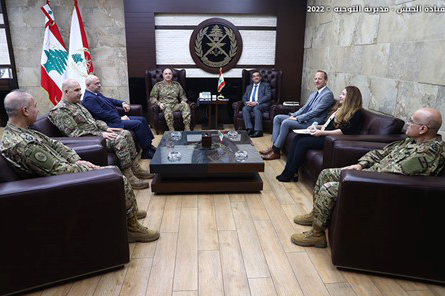
Workstreams/Projects
Since 2020, DCAF has provided comprehensive support to the Lebanese Armed Forces (LAF) to strengthen Civil-Military Cooperation (CIMIC). Our technical expertise at the conceptual, strategic, and operational levels has helped the LAF-CIMIC Directorate build stronger connections between security providers and citizens, including within vulnerable communities. This support aims to foster trust, promote transparency, and enhance security for all Lebanese citizens.
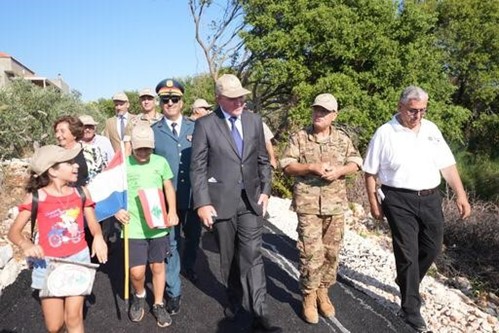
Through the “Supporting the Lebanese Armed Forces in Strengthening Civil-Military Relations” project, funded by the Kingdom of the Netherlands (2020-2026), DCAF assists the LAF-CIMIC Directorate in implementing a domestic CIMIC approach. This approach builds and strengthens institutional mechanisms for public participation in security services, enhancing human security and promoting stability and community cohesion across Lebanon. By addressing essential security needs, this project fosters stronger ties between security providers and local communities.
To support the Lebanese Armed Forces - CIMIC Directorate, DCAF provides specialized technical assistance and CIMIC training, enhancing coordination among all international partners involved with the Directorate. We facilitate knowledge exchange on Civil-Military Cooperation with relevant national and international organizations to promote best practices. Using a “learning by doing” approach, DCAF establishes mechanisms for accountability, effectiveness, and efficiency within LAF-CIMIC, offering advisory support in technical and program management, from design to implementation, monitoring, and evaluation of community-based projects across Lebanon.
Project Focal Points:
- Senior Programme Manager: Diana Vartanian (d.vartanian@dcaf.ch)
- Head of Office: Adam Styp-Rekowski (a.styp-rekowski@dcaf.ch)
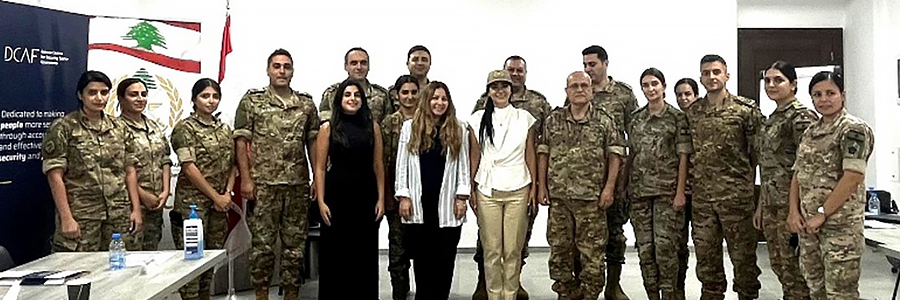
Enhancing Security Sector Oversight in Lebanon: A Holistic Approach to Preventing Torture and other forms of ill-treatment
Since 2020, DCAF has embarked on a transformative journey through the “Supporting Security Sector Oversight in Lebanon” project, funded by the Norwegian Ministry of Foreign Affairs. Now in its second phase, this two-and-a-half-year initiative aims to strengthen human rights protections and enhance accountability within Lebanese security agencies. By supporting more effective oversight mechanisms, the project seeks to prevent torture and ill-treatment, ensuring that security practices align with international human rights standards.
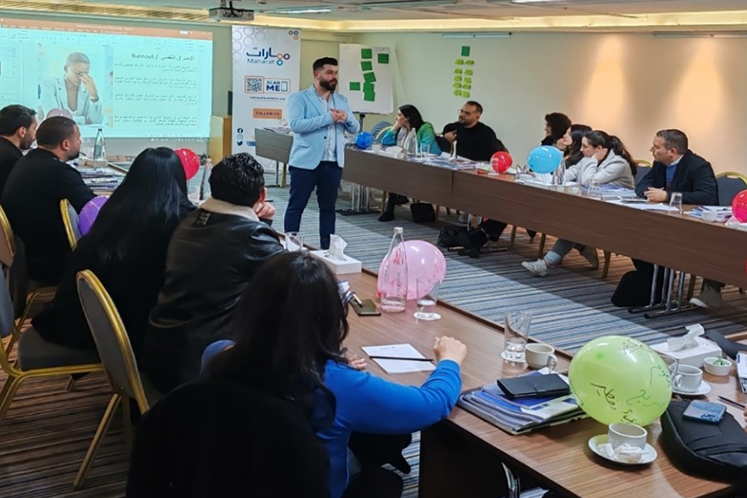
Year 1 (September 2022 - August 2023): Building the Foundation for Reform
In the first year, DCAF concentrated on establishing a robust foundation for security sector reform. This phase included comprehensive training programs for key security agencies, such as the Internal Security Forces (ISF), the General Directorate for General Security (DGGS), and the Directorate General for State Security (DGSS). We mapped out critical legal reforms to prevent torture, analyzed media coverage of the security sector to foster collaboration with journalists, and supported the National Human Rights Commission’s Committee for the Prevention of Torture (NHRC-CPT) in prison monitoring and reporting. Additionally, we partnered with a think tank to research Lebanon’s military justice system with a focus on fair trial rights and initiated ongoing training for lawyers to enhance justice sector practices.
Years 2 and 3 (September 2023 - March 2025): Implementation and Engagement
In Years 2 and 3, DCAF has shifted its focus to executing the frameworks established in Year 1. We actively support the development and implementation of internal oversight procedures within security agencies and provide training for journalists on best practices for reporting on security issues. Our collaboration with local civil society organizations (CSOs) continues, empowering them to advocate for and implement the legal reforms identified in the first year. Additionally, we assist the National Human Rights Commission (NHRC) in realizing key recommendations from their reports and expand our emphasis on military justice themes. Our initiatives also include enhancing the capacities of lawyers through expanded training and collaborating with judges and members of parliament to strengthen their roles in overseeing and preventing torture and ill-treatment.
Key Project Components
1. Capacity Building for Security Agencies:
- Developing and implementing internal procedures for torture prevention.
- Drafting strategic documents, policy papers, and guidelines.
- Training security personnel on new investigation and detention procedures.
2. Support to State Institutions:
- Enhancing the roles of the National Human Rights Commission, National Preventive Mechanism, Parliament, and Judiciary in overseeing torture prevention.
- Facilitating more active involvement in monitoring and accountability.
3. Engagement with Civil Society and Media:
- Integrating civil society and media into the oversight framework.
- Focusing on the monitoring and prevention of torture and ill-treatment.
By engaging a diverse range of stakeholders—including security agencies, state institutions, civil society, and media—this project adopts a comprehensive and inclusive approach to Security Sector Governance (SSG). Our multifaceted strategy not only enhances oversight mechanisms but also fosters widespread support for sustainable reforms.
Publications and Reports
Resources:
- Study on Monitoring Media Coverage of the Security Sector in Lebanon - Arabic - English
- Report on Military Justice: Challenges Faced Under Military Judiciary's Jurisdiction
- Report on Military Justice: Military Judiciary's Handling of Torture Cases
This project underscores DCAF’s pivotal role in Lebanon’s security sector reform landscape, demonstrating our capacity to tackle complex, cross-cutting issues and drive systemic change. Through practical training, strategic oversight frameworks, and transparent communication, we are cultivating an environment of accountability and human rights protection in Lebanon.
Project Focal Points:
- Programme Manager: Norma Kaazan (n.kaazan@dcaf.ch)
- Head of Office: Adam Styp-Rekowski (a.styp-rekowski@dcaf.ch)
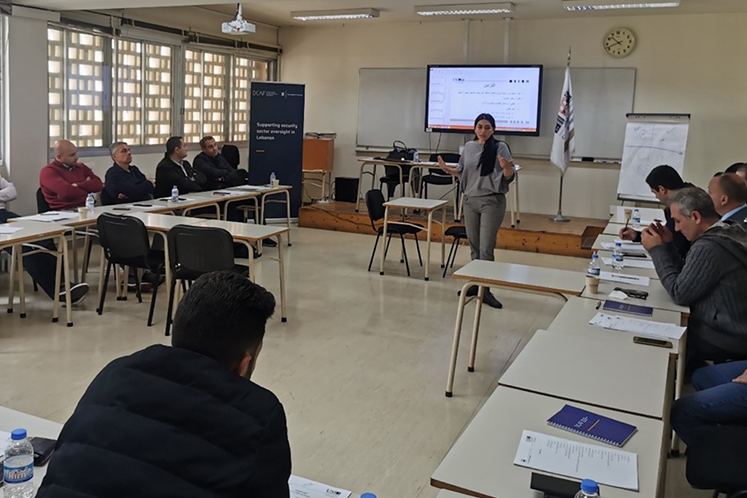
From April 2023 to March 2026, DCAF is collaborating with the Lebanese General Security (GS) on a project funded by Global Affairs Canada, titled “Enhancing Gender-Responsive Security Provision in Lebanon’s Migration Management System.” This three-year initiative focuses on four key areas:
- Establishing a Culture of Mediation: We support GS in establishing a dedicated mediation unit, facilitating multiple mediation training sessions, and developing a mediation diploma programme at the GS Academy.
- Promoting Gender Equality: DCAF works to strengthen mandates related to human rights and gender both internally in GS and externally in its services and developing and implementing a gender training programme at the Academy.
- Outreach and Communication: We assist in operationalizing a Civil-Military Cooperation (CIMIC) unit within GS to enhance engagement and communication with the population.
- Collaborative Research: Together with GS and Lebanese universities, we are developing research on key topics related to GS’s mandate, including security, gender, and migration.
Lebanon’s GS is responsible for managing all aspects of migration, border management, and the status of migrant residence, including the government’s estimation of over 1.5 million Syrian refugees and around 250,000 female migrant domestic workers (UN 2021). In partnership with GS, we are implementing an inclusive, participatory, and gender-sensitive approach to migration management, which is aiming to mitigate tensions between host and refugee communities. This project has been co-designed with GS to uphold human security, promote gender equality, and protect human rights for refugees, migrants, and host communities alike.
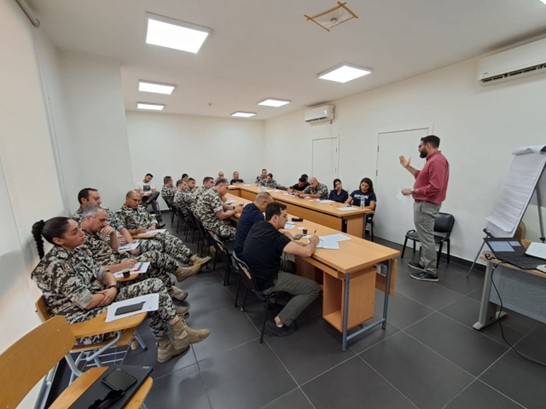
In this context, we support GS in fostering a culture of mediation, both internally within the organization and externally in interactions with clients. We collaborate with the Centre of Professional Mediation at the University of Saint Joseph in Beirut, one of the leading mediation centres in the Middle East, to enhance these efforts. Overall, DCAF provides inclusive governance support for new internal organizational structures and capacity building. This includes co-drafting strategies and policies and assisting GS in leading the implementation of CIMIC capacities, identifying community needs, developing project proposals, and monitoring project execution.
Project Focal Points:
- Project Manager: Karina Pedersen (k.pedersen@dcaf.ch)
- Head of Office: Adam Styp-Rekowski (a.styp-rekowski@dcaf.ch)
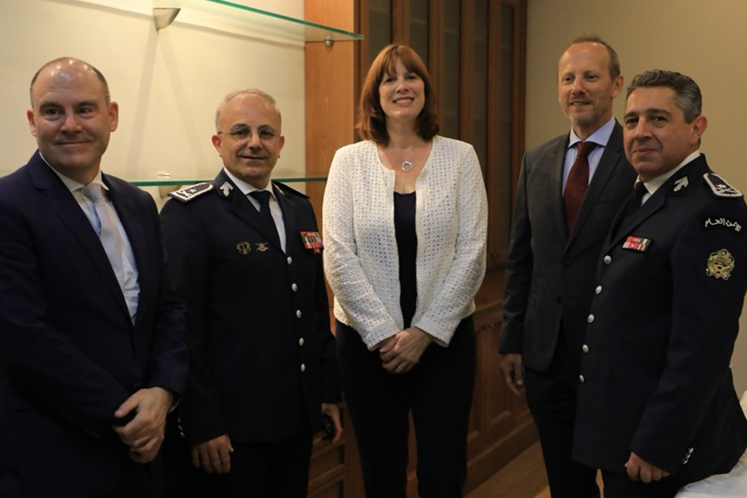
| Adam Styp-Rekowski | Head of Office |
| Diana Vartanian | Senior Programme Manager |
| Norma Kazaan | Programme Manager |
| Karina Pedersen | Project Manager |
| Talal Hussein | Resource Manager |
| Marwan Kotob | Project Officer |
| Hanin Tamim | Junior Project Officer |
| Shahed Tabaja | Junior Project Officer - Finance |
| Salah Salloum | Driver |
PUBLICATIONS
Contacts
Adam Styp-Rekowski, Head of Lebanon Office (a.styp-rekowski@dcaf.ch)
Diana Vartanian, Senior Programme Manager (d.vartanian@dcaf.ch)

